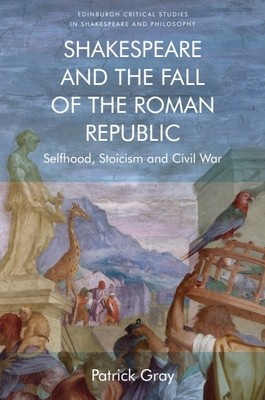
- We will send in 10–14 business days.
- Author: Patrick Gray
- Publisher: Edinburgh University Press
- ISBN-10: 1474427456
- ISBN-13: 9781474427456
- Format: 16 x 23.4 x 2.3 cm, hardcover
- Language: English
- SAVE -10% with code: EXTRA
Reviews
Description
Explores Shakespeare's representation of the failure of democracy in ancient Rome
Shakespeare and the Fall of the Roman Republic introduces Shakespeare as a historian of ancient Rome alongside figures such as Sallust, Cicero, St Augustine, Machiavelli, Gibbon, Hegel and Nietzsche. In Julius Caesar and Antony and Cleopatra, Shakespeare shows Rome's transition from Republic to Empire. Why did Rome degenerate into an autocracy? Alternating between ruthless competition, Stoicism, Epicureanism and self-indulgent fantasies, Rome as Shakespeare sees it is inevitably bound for civil war. Shakespeare and the Fall of the Roman Republic considers Shakespeare's place in the history of concepts of selfhood and reflects on his sympathy for Christianity, in light of his reception of medieval Biblical drama, as well as his allusions to the New Testament. Shakespeare's critique of Romanitas anticipates concerns about secularisation, individualism and liberalism shared by philosophers such as Hannah Arendt, Alasdair MacIntyre, Charles Taylor, Michael Sandel and Patrick Deneen.
Key Features:
- Explains Shakespeare's interpretation of the underlying causes of the Roman Republican civil wars
- Shows how Shakespeare uses Roman history as a testing-ground to arbitrate between competing claims about human nature
- Articulates Shakespeare's distinctive, compromise position on selfhood
- Situates Shakespeare within the intellectual history of individualism, Christianity, Romanticism, secularization, and political liberalism
EXTRA 10 % discount with code: EXTRA
The promotion ends in 20d.22:11:25
The discount code is valid when purchasing from 10 €. Discounts do not stack.
- Author: Patrick Gray
- Publisher: Edinburgh University Press
- ISBN-10: 1474427456
- ISBN-13: 9781474427456
- Format: 16 x 23.4 x 2.3 cm, hardcover
- Language: English English
Explores Shakespeare's representation of the failure of democracy in ancient Rome
Shakespeare and the Fall of the Roman Republic introduces Shakespeare as a historian of ancient Rome alongside figures such as Sallust, Cicero, St Augustine, Machiavelli, Gibbon, Hegel and Nietzsche. In Julius Caesar and Antony and Cleopatra, Shakespeare shows Rome's transition from Republic to Empire. Why did Rome degenerate into an autocracy? Alternating between ruthless competition, Stoicism, Epicureanism and self-indulgent fantasies, Rome as Shakespeare sees it is inevitably bound for civil war. Shakespeare and the Fall of the Roman Republic considers Shakespeare's place in the history of concepts of selfhood and reflects on his sympathy for Christianity, in light of his reception of medieval Biblical drama, as well as his allusions to the New Testament. Shakespeare's critique of Romanitas anticipates concerns about secularisation, individualism and liberalism shared by philosophers such as Hannah Arendt, Alasdair MacIntyre, Charles Taylor, Michael Sandel and Patrick Deneen.
Key Features:
- Explains Shakespeare's interpretation of the underlying causes of the Roman Republican civil wars
- Shows how Shakespeare uses Roman history as a testing-ground to arbitrate between competing claims about human nature
- Articulates Shakespeare's distinctive, compromise position on selfhood
- Situates Shakespeare within the intellectual history of individualism, Christianity, Romanticism, secularization, and political liberalism


Reviews